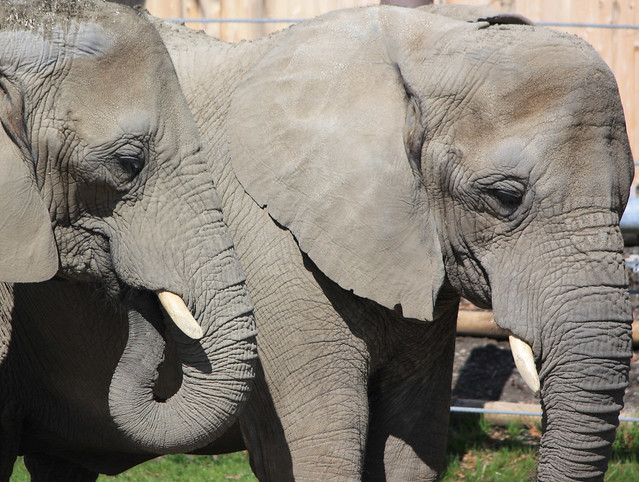Why Worms Are Blind, Elephants Have Small Eyes African Folklore

Why worms are blind, elephants have small eyes African Folklore.
When Ambo was king of Calabar, the elephant was not only a very big animal, but he had eyes in proportion to his immense bulk. In those days’ men and animals were friends, and all mixed together quite freely. At regular intervals King Ambo used to give a feast, and the elephant used to eat more than anyone, although the hippopotamus used to do his best; however, not being as big as the elephant, although he was very fat, he was left a long way behind.
As the elephant ate so much at these feasts, the tortoise, which was small but very cunning, made up his mind to put a stop to the elephant eating more than his fair share of the food. He therefore placed some dry kernels and shrimps, of which the elephant was very fond, in his bag, and went to the elephant's house to make an afternoon call.
When the tortoise arrived the elephant told him to sit down, so he made himself comfortable, and, having shut one eye, took one palm kernel and a shrimp out of his bag, and commenced to eat them with much relish. When the elephant saw the tortoise eating, he said, as he was always hungry himself, "You seem to have some good food there; what are you eating?"
The tortoise replied that the food was "sweet too much," but was rather painful to him, as he was eating one of his own eyeballs; and he lifted up his head, showing one eye closed. The elephant then said, "If the food is so good, take out one of my eyes and give me the same food.
"The tortoise, who was waiting for this, knowing how greedy the elephant was, brought a sharp knife with him for that very purpose, and said to the elephant, "I cannot reach your eye, as you are so big."
The elephant then took the tortoise up in his trunk and lifted him up. As soon as he came near the elephant's eye, with one quick swoop of the sharp knife the elephant's right eye was out. The elephant trumpeted with pain; but the tortoise gave him some of the dried kernels and shrimps, and they so pleased the elephant's palate that he soon forgot the pain.
Very soon the elephant said, "That food is so sweet, I must have some more"; but the tortoise told him that before he could have any the other eye must come out. To this the elephant agreed; so the tortoise quickly got his knife to work, and very soon the elephant's left eye was on the ground, thus leaving the elephant quite blind.
The tortoise then slid down the elephant's trunk on to the ground and hid himself. The elephant then began to make a great noise, and started pulling trees down and doing much damage, calling out for the tortoise; but of course he never answered, and the elephant could not find him.
The next morning, when the elephant heard the people passing, he asked them what the time was, and the bush buck, who was nearest, shouted out, "The sun is now up, and I am going to market to get some yams and fresh leaves for my food.
"Then the elephant perceived that the tortoise had deceived him, and began to ask all the passers-by to lend him a pair of eyes, as he could not see, but everyone refused, as they wanted their eyes themselves. At last the worm groveled past, and seeing the big elephant, greeted him in his humble way. He was much surprised when the king of the forest returned his salutation.
The elephant said, "Look here, worm, I have mislaid my eyes. Will you lend me yours for a few days? I will return them next market-day. "The worm was so flattered at being noticed by the elephant that he gladly consented, and took his eyes out which, as everyone knows, were very small and gave them to the elephant.
When the elephant put the worm's eyes into his own large eye-sockets, the flesh immediately closed round them so tightly that when the market day arrived it was impossible for the elephant to get them out again to return to the worm.
Although the worm repeatedly made applications to the elephant to return his eyes, the elephant always pretended not to hear, and sometimes used to say in a very loud voice, "If there are any worms about, they had better get out of my way, as they are so small I cannot see them, and if I tread on them they will be squashed into a nasty mess. "
Ever since then the worms have been blind, and for the same reason elephants have such small eyes.
 |
| Happiness is Reading African Folktales |
Ever wonder what happens when you remember others, read The Gift of a Cow Tail Switch African Folktale
-
80 African Short Story Folktales you need to read today. Read for the love of culture African Folklore
An African folktale story less home is just a sad house with walls, a floor, and a roof.

